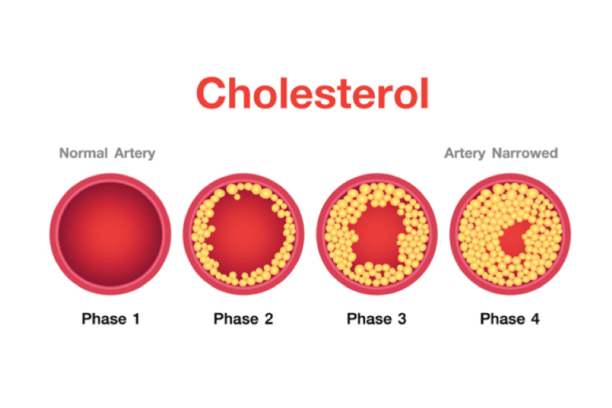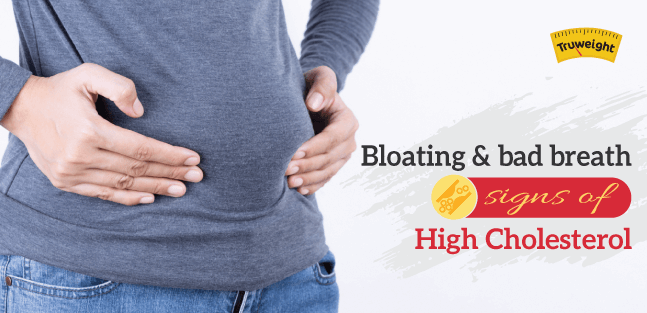Disease, Health, Weight Loss
7 Ways To Know When You Have High Cholesterol
Medically reviewed by Shanmukha Priya, M.Phil and Ph.D. in Food Science and Nutrition
Cholesterol is a fatty substance which is required for the normal functioning of the body.
When the levels of bad cholesterol HDL goes up in your body, the arteries get clogged and do not function optimally. The signs like bad breath, dizziness, stroke means that you need to control your cholesterol.
Table of Contents
- Coronary Artery (Heart) Disease
- Stroke
- Heart Attack
- Peripheral Arteries Disease
- Diagnosis Of High Cholesterol
A fatty substance which is required for the normal functioning of the body by helping in the formation of cell membranes, hormones, and Vitamin D.
High Cholesterol can be inherited in few of the cases but most of the time it is caused due to unhealthy lifestyle choices.
The liver performs a crucial task in the body by producing most of the cholesterol required and regulating its application throughout your body. Remaining cholesterol needs are fulfilled by dietary supplements.
A healthy diet and regular exercise are the keys to avoid the complications from high cholesterol. Few of the risk issues that may upsurge the chances of high cholesterol in your body are:
- Unhealthy Diet
- Large Waist Circumference/Obesity
- Lack Of Exercise
- Diabetes
- Smoking
The Cholesterol levels are calculated in mg (milligrams) per tenth-litre (dl) of blood. Optimum cholesterol level that is the sum of High-Density Lipoprotein (HDL) and Low-Density Lipoprotein (LDL) should be less than 200 mg/dl.
A suitable level of LDL (bad) cholesterol must be lesser than 130 mg/dl and HDL (good) cholesterol should be at least 35 mg/dl in your blood.
Another form of bad cholesterol, a fat (lipid) found in your blood, Triglycerides have the optimum level of 150 mg/dl. Anything above that is to be taken seriously.
There are no symptoms as such of high cholesterol and triglycerides levels in most of the cases. You often cannot feel if your cholesterol levels are increased.
However once the cholesterol level breaches the optimum level in your blood, you may put yourself to the risk of having a heart attack or stroke.
Without you even noticing or feeling anything, high cholesterol causes the formation of plaque in the arteries thereby narrowing the path through which blood can pass. Mentioned below are the serious medical conditions and related symptoms in case you have high cholesterol and triglycerides and are exposed to cardiovascular diseases:
1. Coronary Artery (Heart) Disease
Coronary Artery (Heart) Disease is mainly caused due to the reduction of blood flow and oxygen to the heart muscle caused by fatty deposits in the arteries. The intensity of symptoms may be different for both men and women but most of the common symptoms are listed below:
- Chest Pain
- Nausea
- Shortness Of Breath
- Extreme Fatigue
- Pain in the jaw, neck, back or upper abdomen
- Numbness in your extremities
Fatty deposits incapacitate the heart to pump blood to different body parts by restricting the oxygen supply to heart muscles.
2. Stroke
Stroke is a medical condition in which restricted or poor blood flow to the brain results in brain cell death. Stroke is an emergency medical situation and timely medical attention is required otherwise it may turn out to be fatal. Few of the symptoms of Stroke are listed below:
- Dizziness
- Sudden loss of balance and coordination
- Confusion
- Inability to move your body or part of it
- Slurring words
- Numbness in your body especially face, arm or leg
- A severe Headache
- Blurred Vision
Within minutes brain cells begin to die due to restricted oxygen and nutrients supply. Timely intervention can minimize the brain damage and associated complications.

3. Heart Attack
High Cholesterol results in the formation of plaque in the arteries thereby reducing the supply of oxygen and nutrients to the heart muscles. This process happens slowly and gradually with no symptoms at all.
Eventually, a piece of plaque breaks off and forms a blood clot around it. This blood clot totally restricts the flow of oxygen and nutrients to the heart muscles thereby causing a heart attack.
Heart Attack is a fatal medical condition and demands immediate attention. Lack of oxygen and nutrients result in total damage to heart or part of the heart. A severe heart attack may result in death as well. Mentioned below are the symptoms of a heart attack:
- Pain or aching in the chest or arm
- Difficulty in breathing
- Dizziness
- Anxiety
- Nausea, Indigestion or Heartburn
- Excessive Fatigue
Like all other conditions stated above heart attack occurs due to unhealthy lifestyle choices. Regular exercise and eating healthy can reduce the chances of the heart attack in an individual. However, if it’s too late then medical treatment involves Bypass Surgery and Placement of Stents in the arteries in the blood vessels. These treatments can take from weeks to months.
4. Peripheral Arteries Disease
Occurs when plaque is deposited in the walls of the arteries thereby restricting the oxygen and nutrients supply to other parts of the body such as kidneys, arms, stomach and legs.
Early symptoms of Peripheral Arteries Disease may include:
- Achiness
- Fatigue
- Cramps
- Discomfort and Pain in legs
The disease progresses the symptoms become severe which can be:
- Paleness of Skin
- Tissue death due to lack of oxygen supply
- Ulcers on the legs and feet
- Burning sensation in your toes
- The decrease in body temperature
- Leg Cramps
- Thick Toenails
- Reduced hair growth in the legs
People with this disease are also at the higher risk of Stroke and Heart Attack.
glycerides in your body
Dizziness and Headaches
Bulging yellow eyes, blurred vision and irritation in the eyes
Swelling and numbness of limbs due to restricted supply of blood and oxygen to muscles
Halitosis or bad breath is common with people having high cholesterol
Bloating or Indigestion in your stomach caused due to uncontrolled levels of bad cholesterol present in your blood
Constipation due to building up of lipids in the arteries
Chest Pain
Chronic Fatigue and Weariness
Skin Rashes, Red Spots on the Skin and Itching sensation
Food Allergies
Diagnosis Of High Cholesterol
It can be easily diagnosed with a blood test called lipid panel in which doctor takes a blood sample and test it to determine the levels of LDL (bad) cholesterol, HDL (good) cholesterol and triglycerides in your blood. 12 hours of fasting is required prior to the test.
Unhealthy lifestyle ultimately has taken a toll on our body and to control this we seek more medical attention. The only way to avoid this scenario is to indulge in regular exercise and eat healthily.
